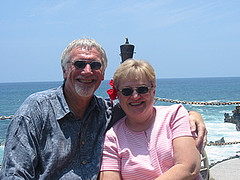Floyd McClung wrote the following: “One
can be a missionary and be unspiritual, and a businessperson and be deeply
spiritual. One can avoid attending church on Sunday but be an active member of
a disciple making community that worships on Friday
 nights, and be spiritual.
nights, and be spiritual.
The day of the week you gather with other believers does not make one
spiritual. Being like Jesus does.
Pseudo-spirituality is attractive only if we don’t experience true life.
Pseudo-spirituality seeks growth from establishing false boundaries, ways of
guaranteeing spiritual growth. The boundaries we establish are often highly
visual but relationally superficial practices that allow ourselves a modicum of
security in regards to being “spiritual.” But Jesus taught that we are not to
be conformed to religious rules and sub-cultures, but rather to be transformed
by simple faith.
True spiritual faith is dangerous because there is no way to guarantee one
has it. No religious practice, no belief, nothing can produce such faith. Such
faith is a personal response not a practice or belief. Sometimes orthodoxy is
over-rated. Faith is trust in a person, not espousing a set of beliefs.
How do we guard against pseudo-spirituality? By recognizing it’s ugly
presence, not in others, but in our selves. Pseudo-spirituality occurs when we
seek the appearance of being spiritual. We can tell it’s root system is growing
deep in us when we become judgmental, exclusive or proud.
Our spirituality is inauthentic if we become less approachable human beings
as our responsibilities in life increase. Think about Jesus.
We are pseudo-spiritual if our spirituality is not resulting in us becoming
more like Jesus. He is the true standard. To be spiritual is not to be weird.
True spirituality involves death, but not imposed death or shame-based
death. To be truly alive we go through a death process to what is not real or
alive or truthful in us. To be free is to die to our false self.”




Hi!
I’m doing some research on Liberal theology at the moment and I’m reading JG Machen’s Christianty and Liberalism. He said that the Liberals of his day were saying:
Should not our trust be in a Person rather than in a message?…Christianity is a life, not a doctrine…creeds are merely the changing expression of a unitary Christian experience.
You say here that “Faith is trust in a person, not espousing a set of beliefs” – that sounds exactly like the Liberals were saying 100 years ago. It doesn’t matter what you believe as long as you trust in Jesus (as if you can or should divorce trusting in Jesus from beliefs about him)
Would you care to comment?
regards, Jim
sure, Jim. First of all, clearly there is a need for sound doctrine. the practice of our faith must be based on the strong foundation of sound doctrine. Of course our belief must be grounded or it is purely subjective.
But what is faith really? Faith is spelled R-I-S-K. It is a muscle that is exercised, primarily in the realm of human interaction. When we trust people, we take a risk that they will abuse that trust.
What you are describing is not faith, certainly not as Jesus practiced it and as he pointed it out in other people. You are describing “the faith.” The faith is more about religion and about cognative assent than it is about spiritual praxis. Orthoproaxy is at least as important as orthodoxy.
Hi Seth,
What do you mean by:
Faith is spelled R-I-S-K ? Would you agree that unbelievers have ‘faith’ in something?
Which spiritual practice? Pilgrimage to Mecca? (and if we disqualify that, aren’t we back to defining ‘the faith’ and testing practice by doctrine?)
Best Wishes, Jim
Right. Faith is religion-neutral. As is love. As is hope. But that doesn’t mean you need any of them less. It sounds to me like you may have a praxis problem. I don’t know you, so it’s a guess based on my observation of a lot of Christians who dwell in safety zones of theological inquiry unattached to real life. I find it helps to ask this question: When was the last time you really took a risk to advance the kingdom? If it’s been a while, then you may want to ask God to challenge you to put your faith into action.